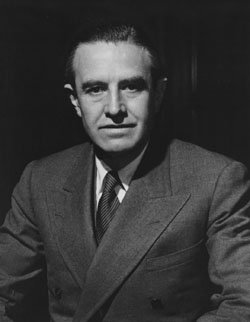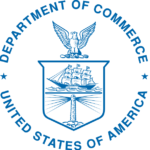William Averell Harriman
- Nationality
- U.S.A.
- Date of Birth
- 1891
- Date of Death
- 1986
- Political
Preference - Democratic Party

Averell Harriman was an American businessman, entrepreneur and eventually diplomat, who was born in 1896 as the son of railroad-tycoon Edward Henry Harriman, founder of the Union Pacific Railway. In 1913, he graduated from Yale University.
During the 1920s, Harriman was a successful businessman, active in banking, transatlantic shipping, (inter)national railroads, aviation, but also in European mining corporations. In the 1930s, Harriman was influenced by Franklin D. Roosevelt’s New Deal, and he enrolled in Roosevelt’s Business Advisory Council (BAC).
When the Second World War broke out, Harriman joined the government in its preparations for war. In 1940, he was a member of the National Defense Advisory Commission (NDAC). Here, Harriman argued for increased U.S. involvement to support the British was effort. In January 1941, Harriman headed the Office of Production Management (OPM), which was to oversee U.S. military production. In March 1941, Harriman was appointed as Roosevelt’s Lend-Lease expeditor, and he was sent to London. Here he built intimate friendships with members of the British Cabinet, but most of all with the Churchill family (most notably with Pamela Churchill, whom he married later in his life). Harriman became Roosevelt’s most important envoy in the wartime alliance that grew between the U.S., the U.K. and the Soviet Union. He travelled with Churchill to talk with Stalin, and accompanied him to important conferences. In 1943, Harriman was appointed as U.S. Ambassador to Moscow.
In Moscow, Harriman developed a gradual distrust of the Soviet intentions with Eastern Europe, and he became an advocate of economic cooperation with Western Europe. In this regard, Harriman became a close adviser to President Harry S. Truman, who he cautioned against being too soft on Russia. In this, he was supported by men like George F. Kennan and Dean Acheson – both of whom Harriman knew well.
In 1946, Harriman became Secretary of Commerce, and he became an advocate of economic aid to Europe. When the Marshall Plan was announced in 1947, Harriman headed a group of seventeen distinguished citizens (mostly from the business community and academic life) which came to be known as the President’s Committee on Foreign Aid. The Harriman Committee met with its European counterpart in Washington in October 1947, when members of the Committee for European Economic Cooperation (CEEC) came over to discuss their aid-proposal. In November 1947, the Committee advised Congress on the necessity to provide economic assistance to Europe.
In 1948, Harriman – who had by now emerged as a strong advocate of European (economic) unity – was appointed as the U.S. Special Representative in Europe. From this position, he worked under Economic Cooperation Administration (ECA) head Paul G. Hoffman, and he would oversee from Paris the progress made by European countries in rebuilding their economy. During his time as Special Representative, Harriman especially argued for a stronger political representation of the Organisation for European Economic Cooperation (OEEC).
In 1950, when Marshall aid became more of a military nature, Harriman became Truman’s Special Assistant. In 1951, Harriman was appointed Director of the Mutual Security Agency – which replaced ECA.
Throughout the 1950s and 1960s, Harriman would have a long diplomatic career, and he even competed for the Democratic nomination in the 1952 elections (which he lost to Adlai Stevenson). Harriman died in 1986, and was buried at the family estate of Arden.


